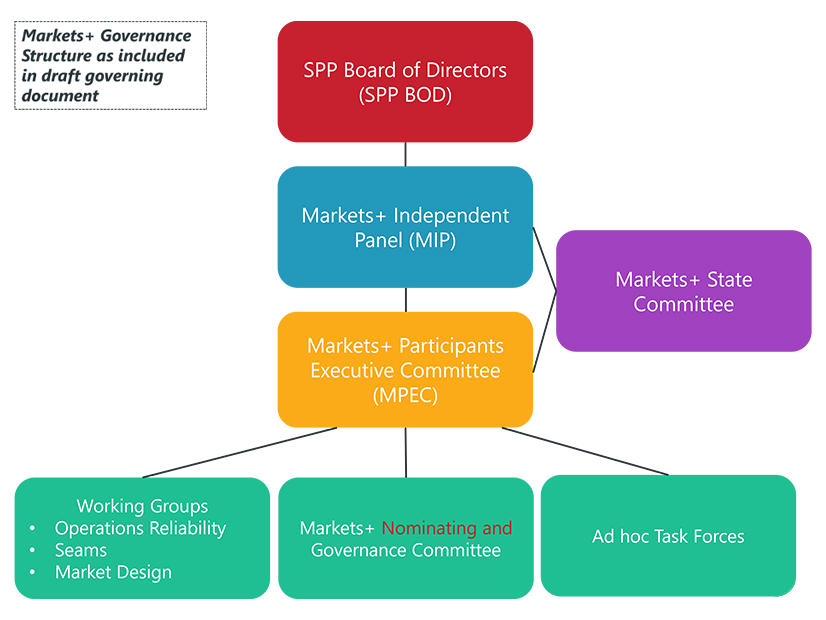As SPP moves closer to finalizing its Markets+ governance structure, the grid operator hosted a webinar largely focused on a committee that will nominate members of the market’s decision-making body.
As SPP moves closer to finalizing the governance structure of its Markets+ day-ahead offering, the grid operator hosted an Oct. 19 webinar focused largely on a committee that will nominate members of the Markets+ decision-making body.
The committee will put forth candidates to serve on the five-member Markets+ Independent Panel (MIP), described as the highest level of authority for Markets+ decisions. The SPP Board of Directors will have oversight of the MIP.
MIP members must be independent from Markets+ participants and stakeholders. Panel members will be elected by the Markets+ Participants Executive Committee (MPEC), which will consist of representatives of each Markets+ participant and stakeholder.
A slide presented during an MPEC meeting in Portland, Ore., in August led some to mistakenly believe the nominating committee was being eliminated, according to Paul Suskie, SPP’s executive vice president of regulatory policy and general counsel. Instead, the nominating committee will have an expanded role to also conduct “periodic reviews” of the Markets+ governance structure.
“It’s not eliminated. It’s actually expanded in its duties,” Suskie said during the Markets+ governance webinar.
The name of the committee has been changed to the Markets+ Nominating and Governance Committee (MNGC) to better reflect its roles and eliminate confusion. Most stakeholders who have weighed in support the committee’s expanded role.
Day-ahead Competition
The discussion comes as competition is heating up between two day-ahead offerings: SPP’s Markets+ and CAISO’s Extended Day-Ahead Market (EDAM). Governance is an issue that often arises when the two are compared, raising debates about independence. (See In Contest for the West, Markets+ Gathers Momentum – and Skeptics.)
In August, CAISO filed tariff revisions to implement EDAM with FERC. (See CAISO Files EDAM Proposal with FERC.)
The Markets+ governing documents will be included as an attachment to the Markets+ tariff, expected to be filed with FERC early next year.
But before the FERC filing, the governing documents will be presented to the MPEC next month. Stakeholders still have a chance to submit proposed amendments through Nov. 17.
SPP staff will recommend that the MPEC approve tariff language at its December meeting. From there, it’s expected to go to the interim MIP, with the SPP board of directors voting on it in January.
The newly dubbed MNGC will include a representative from each of 12 sectors, such as independent power producers, cooperatives, municipal utilities and federal agencies. The latest governance proposal has added a representative of state agencies and provincial entities.
Suskie said one issue still to be worked out is how to prevent the MNGC from becoming geographically lopsided. As an example, he said, the sectors could potentially all select a representative from Colorado.
SPP is looking at ways to avoid such a scenario.
“It’s something we’re going to think through, reach out to some folks, and maybe propose something for the MPEC to consider,” Suskie said.
The MNGC will nominate candidates to vacant seats on the MIP. Candidates may also be nominated with support from at least 20% of MPEC representatives.
The MNGC will also be able to make recommendations to the MPEC regarding governance changes. Proposed changes would need a four-fifths vote from the MIP before being filed with FERC.
State-based Advisory Panel
Yet another committee in the governance structure is the Markets+ State Committee (MSC), an advisory panel to the MIP, MPEC and task forces or working groups.
As now proposed, MSC members will come from each state in which a Markets+ participant has generation or load. Some stakeholders have argued that states with MSC representation should be required to have load.
BPA supports the participation in MSC of states with “generation or load.” In written comments, BPA said the committee’s advisory role “is strengthened by the inclusivity of states in the Markets+ footprint, both generation and load.”
But AEPCO argued that only states with load in the Markets+ footprint should be eligible to participate in the MSC.
“A state with only generation should not be eligible, as a single generator in a non-contiguous state that contracts with Markets+ could otherwise trigger MSC eligibility,” AEPCO said in written comments.




